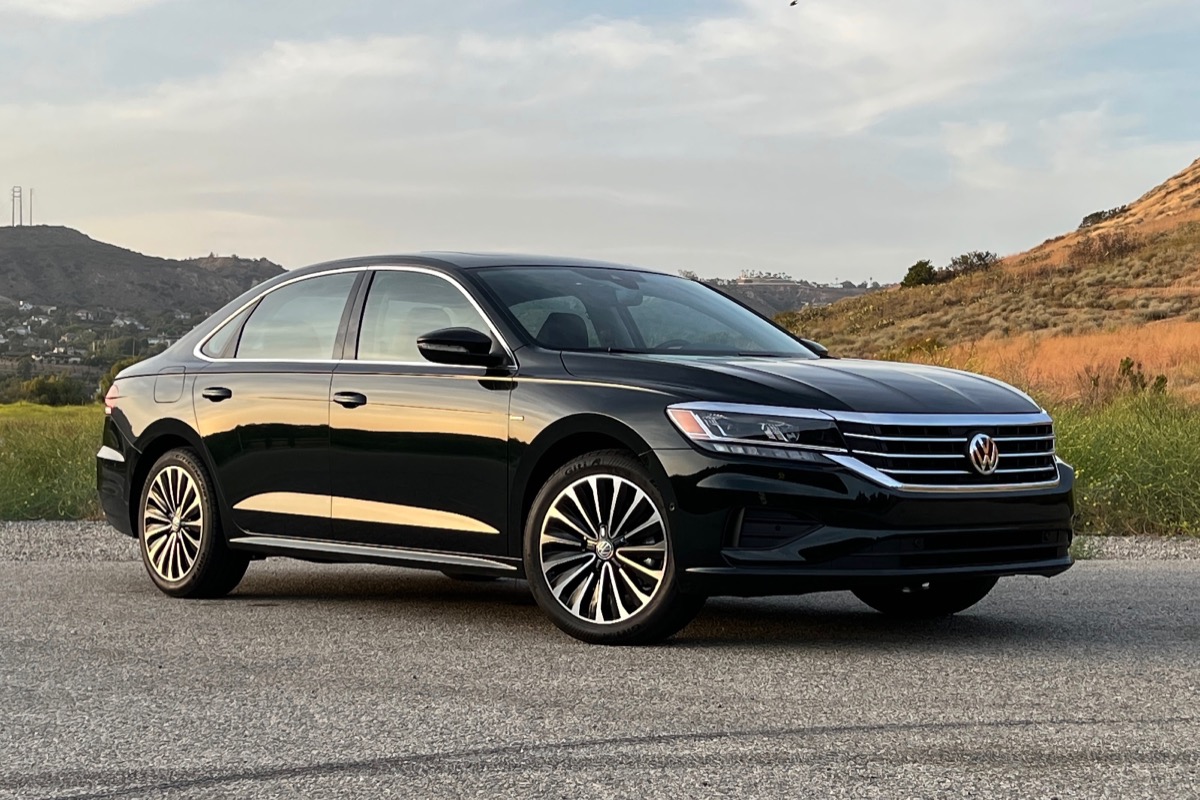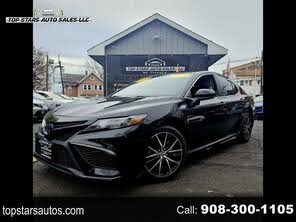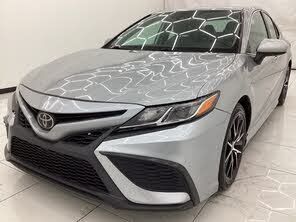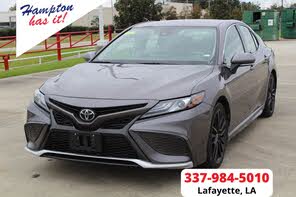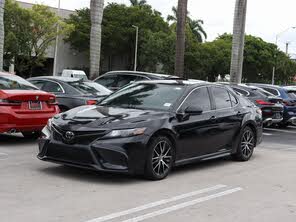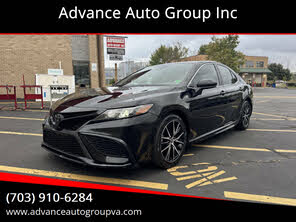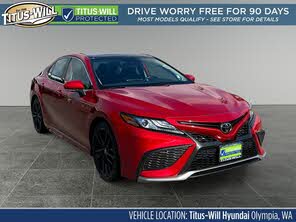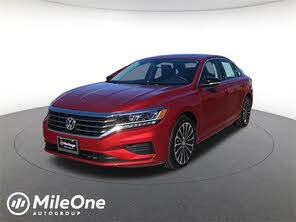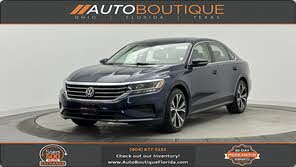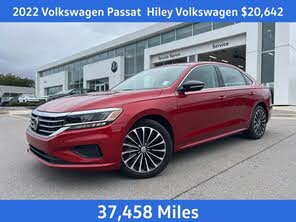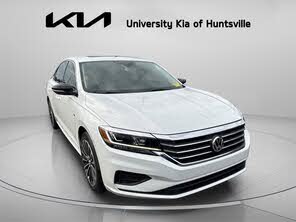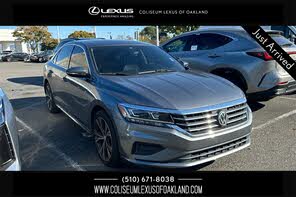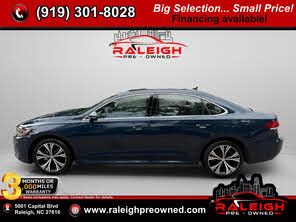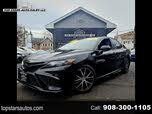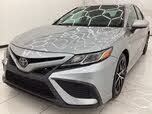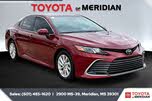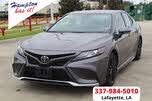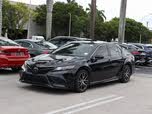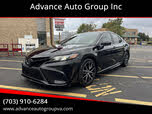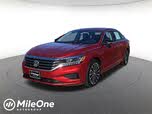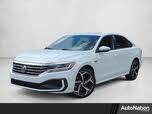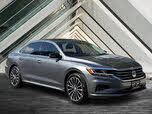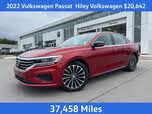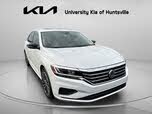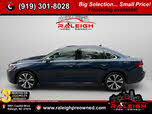2021 Toyota Camry vs 2022 Volkswagen Passat
Overview | |
MSRP$25,045 | MSRP$27,575 |
Listings1445 | Listings218 |
Ratings & Reviews | |
User Reviews | User Reviews |
Expert reviews7.8 out of 10 | Expert reviews6.0 out of 10 |
Pros
Cons
| Pros
Cons
|
2021 Toyota Camry Reviews SummaryThe Toyota Camry has long been many new-car buyers’ default choice—but not because it’s interesting. Reliability and practicality have traditionally been the Camry’s strengths, not sportiness or style. Toyota tried to change that for the 2018 model year, when the Camry was last redesigned. The current-generation Camry adopted more extroverted styling, and engineers tried to make the driving experience more exciting, too. While Toyota’s approach has changed, the Camry still competes against the same array of midsize sedans, including the Honda Accord, Hyundai Sonata, Mazda 6, Nissan Altima, Subaru Legacy, and Volkswagen Passat. Changes for the 2021 model year include subtle styling tweaks, new infotainment displays, an upgrade to the Toyota Safety Sense 2.5+ (TSS 2.5+) package of driver aids, some changes to the dashboard trim, and the discontinuation of the Camry L trim level. That leaves the Camry LE as the new base trim level. The Camry offers buyers more choices than many rivals, encompassing three powertrains (inline-four, V6, and hybrid), six trim levels (LE, XLE, SE, SE Nightshade Edition, XSE, and TRD), and the choice of front-wheel drive (FWD) or all-wheel drive (AWD). Our test car was an AWD SE Nightshade Edition, positioned close to the middle of the lineup. | |
2022 Volkswagen Passat Reviews SummaryFirst came the Dasher in 1974, then the Quantum in 1982, then the Passat in 1990. None became household names like the Honda Accord or Toyota Camry, partly because the Passat and its progenitors appealed to a small contingent of Americans seeking European design, engineering, and driving dynamics in a car often characterized as a bargain-priced Audi. But in the midsize sedan segment, a reputation for reliability and efficiency, not design or handling, is king. Tired of compromise, Volkswagen "Americanized" the Passat for the 2011 model year, moving production to a new factory in Chattanooga, Tennessee. The car's blandly attractive design, huge interior, big trunk, and soft ride seemed to be just what U.S. customers wanted, along with a ”Made in the USA” label. But those potential buyers had moved on to SUVs, and the new Passat alienated some of the VW faithful. The Dieselgate scandal didn't help the Passat, either. VW nailed the car's coffin shut when the family car segment began to wither rapidly. So now, the Passat departs the U.S. market, effectively replaced by the Tiguan and Atlas SUVs and leaving the Jetta to serve people who still want a sedan wearing a VW logo on its grille. | |
No video found | No video found |
Popular Features & Specs | |
Engine2.5L 203 hp I4 | Engine2.0L 174 hp I4 |
Drive TrainFWD | Drive TrainFWD |
Seating Capacity5 | Seating Capacity5 |
Horsepower | Horsepower174 hp @ 5200 rpm |
MPG City28 | MPG City24 |
MPG Highway39 | MPG Highway36 |
Engine | |
Engine Name2.5L 203 hp I4 | Engine Name2.0L 174 hp I4 |
Torque | Torque206 lb-ft @ 1700 rpm |
Horsepower | Horsepower174 hp @ 5200 rpm |
DrivetrainFWD | DrivetrainFWD |
Fuel Economy | |
MPG City28 | MPG City24 |
MPG Highway39 | MPG Highway36 |
Interior | |
Seating Capacity5 | Seating Capacity5 |
Key Features | |
Sunroof/Moonroof | Sunroof/MoonroofStandard |
Safety | |
Front Crash Overall5 | Front Crash Overall3 |
Side Crash Overall5 | Side Crash Overall5 |
Dimensions & Capacity | |
Cargo Space15.1 cu ft | Cargo Space15.9 cu ft |
Curb Weight3310 lbs | Curb Weight3369 lbs |
Height56.9 in | Height58.7 in |
Length192.1 in | Length193.6 in |
Width72.4 in | Width72.6 in |
Wheelbase111.2 in | Wheelbase110.4 in |
Maximum Payload925 lbs | Maximum Payload937 lbs |
Number of doors4 | Number of doors4 |
Overview | ||
MSRP | $25,045 | $27,575 |
Listings | ||
Ratings & Reviews | ||
User reviews | ||
Expert reviews | 7.8 out of 10Read full review | 6.0 out of 10Read full review |
Pros & cons | Pros
Cons
| Pros
Cons
|
Summary | The Toyota Camry has long been many new-car buyers’ default choice—but not because it’s interesting. Reliability and practicality have traditionally been the Camry’s strengths, not sportiness or style. Toyota tried to change that for the 2018 model year, when the Camry was last redesigned. The current-generation Camry adopted more extroverted styling, and engineers tried to make the driving experience more exciting, too. While Toyota’s approach has changed, the Camry still competes against the same array of midsize sedans, including the Honda Accord, Hyundai Sonata, Mazda 6, Nissan Altima, Subaru Legacy, and Volkswagen Passat. Changes for the 2021 model year include subtle styling tweaks, new infotainment displays, an upgrade to the Toyota Safety Sense 2.5+ (TSS 2.5+) package of driver aids, some changes to the dashboard trim, and the discontinuation of the Camry L trim level. That leaves the Camry LE as the new base trim level. The Camry offers buyers more choices than many rivals, encompassing three powertrains (inline-four, V6, and hybrid), six trim levels (LE, XLE, SE, SE Nightshade Edition, XSE, and TRD), and the choice of front-wheel drive (FWD) or all-wheel drive (AWD). Our test car was an AWD SE Nightshade Edition, positioned close to the middle of the lineup. | First came the Dasher in 1974, then the Quantum in 1982, then the Passat in 1990. None became household names like the Honda Accord or Toyota Camry, partly because the Passat and its progenitors appealed to a small contingent of Americans seeking European design, engineering, and driving dynamics in a car often characterized as a bargain-priced Audi. But in the midsize sedan segment, a reputation for reliability and efficiency, not design or handling, is king. Tired of compromise, Volkswagen "Americanized" the Passat for the 2011 model year, moving production to a new factory in Chattanooga, Tennessee. The car's blandly attractive design, huge interior, big trunk, and soft ride seemed to be just what U.S. customers wanted, along with a ”Made in the USA” label. But those potential buyers had moved on to SUVs, and the new Passat alienated some of the VW faithful. The Dieselgate scandal didn't help the Passat, either. VW nailed the car's coffin shut when the family car segment began to wither rapidly. So now, the Passat departs the U.S. market, effectively replaced by the Tiguan and Atlas SUVs and leaving the Jetta to serve people who still want a sedan wearing a VW logo on its grille. |
Video | No video found | No video found |
Popular Features & Specs | ||
Engine | 2.5L 203 hp I4 | 2.0L 174 hp I4 |
Drive Train | FWD | FWD |
Seating Capacity | 5 | 5 |
Horsepower | 174 hp @ 5200 rpm | |
MPG City | 28 | 24 |
MPG Highway | 39 | 36 |
Engine | ||
Engine Name | 2.5L 203 hp I4 | 2.0L 174 hp I4 |
Torque | 206 lb-ft @ 1700 rpm | |
Horsepower | 174 hp @ 5200 rpm | |
Drivetrain | FWD | FWD |
Fuel Economy | ||
MPG City | 28 | 24 |
MPG Highway | 39 | 36 |
Interior | ||
Seating Capacity | 5 | 5 |
Key Features | ||
Sunroof/Moonroof | Standard | |
Safety | ||
Front Crash Overall | 5 | 3 |
Side Crash Overall | 5 | 5 |
Dimensions & Capacity | ||
Cargo Space | 15.1 cu ft | 15.9 cu ft |
Curb Weight | 3310 lbs | 3369 lbs |
Height | 56.9 in | 58.7 in |
Length | 192.1 in | 193.6 in |
Width | 72.4 in | 72.6 in |
Wheelbase | 111.2 in | 110.4 in |
Maximum Payload | 925 lbs | 937 lbs |
Number of doors | 4 | 4 |
The 2021 Toyota Camry aimed to transcend its staid past, leaving behind the era when it resembled the generic cars from driver’s education textbooks. For this model, Toyota's designers injected a dose of excitement by incorporating various styling elements. The Camry’s flared wheel arches and slender headlights and taillights effectively broadened its visual appeal. Yet, opting for SE, XSE, or TRD trims led to an overlay of fake vents that cluttered the design.
The LE and XLE trims presented an alternative with cleaner, albeit still somewhat massive, grille designs. Beneath all the embellishments, the Camry sat on Toyota’s TNGA-K platform, a versatile architecture shared with models like the Avalon and RAV4.
Toyota also made subtle tweaks to the front fascia for 2021, but the distinctive features of the TRD performance model, like a larger rear spoiler, remained noticeable. Another returning feature was the Nightshade Edition, based on the SE trim but distinguished with blacked-out exterior treatments and wheels. The base LE trim came with 17-inch alloy wheels, while other variants offered 18-inch and 19-inch options.
Inside, the chaos of exterior styling trickled into the interior. The SE Nightshade Edition review unit had a dashboard that seemed like a mismatched assembly of components. Multiple trim elements such as contrast stitching, piano black plastic, and faux-carbon fiber vied for attention without a cohesive theme. Despite using a variety of materials, many felt inexpensively made.
In contrast, Volkswagen marked the end of the Passat's run with the 2022 Limited Edition. This version held a special place above the SE and R-Line trim levels, initially selling for $31,570. Only 1,973 units of the Limited Edition rolled out, celebrating the year the Passat debuted in Europe.
This Limited Edition featured unique 18-inch alloy wheels, black mirror caps, and special badges. It was the sole trim available in a distinctive Racing Green paint. Inside, our test car sported Mauro Brown leather upholstery, complemented by faux wood trim and dark panels. Unique seat tags and a relief map of Chattanooga in the rubber cupholders added thoughtful details.
The Passat exuded an upscale yet aged feel. Despite the design's age, it remained relevant due to the 2020 refresh, and it had managed to age better than many contemporaries. The interior, although sprinkled with thoughtful details, was marred by cheap plastics and outdated technology. The 6.3-inch touchscreen appeared small on the broad dashboard, and the small driver information display between analog gauges seemed archaic. Nonetheless, the Passat’s dashboard exhibited a clean design with integrated air vents and metallic accents, adding a touch of European elegance.
















In terms of performance, the 2021 Toyota Camry packed several punchy powertrain options. The base engine was a naturally aspirated 2.5-liter four-cylinder, dubbed "Dynamic Force," producing 203 horsepower and 184 pound-feet of torque in front-wheel-drive versions and slightly lower figures in all-wheel-drive (AWD) models. The XSE trim with front-wheel drive bumped the output to 206 hp and 186 lb-ft, thanks to a dual-exhaust system.
Additionally, Toyota kept alive a V6 option—a rarity in this segment. The 3.5-liter V6 churned out a robust 301 hp and 267 lb-ft of torque, paired with an eight-speed automatic transmission. For eco-friendly options, the 2021 Camry Hybrid combined the 2.5-liter four-cylinder with electric assistance, generating a combined output of 208 hp. However, the V6 and hybrid models were only available with FWD.
Our SE Nightshade Edition test car featured the base four-cylinder and AWD. We found the Dynamic Force engine lived up to its name, delivering an engaging and rev-happy drive that defied the expectations of a typical family sedan. The Camry's chassis struck a fine balance between handling precision and ride comfort, although steering feedback was somewhat lackluster. Overall, the driving experience was notably enjoyable, especially for those who appreciate spirited driving.
For enthusiasts, the performance-focused TRD model, introduced in 2020, was a major highlight. It combined the V6 engine with enhancements like lowered suspension, stiffer springs, sway bars, TRD shocks, bigger brakes, and optional Bridgestone Potenza summer tires.
The 2020 reintroduction of AWD, previously available only from 1988 to 1991, carried over to 2021. This system, derived from the RAV4, could send up to 50% of torque to the rear wheels when needed, but defaulted to FWD otherwise. Importantly, the AWD hardware did not compromise passenger or cargo space.
Switching to the 2022 Volkswagen Passat, its driving dynamics presented a mixed bag. The Passat's lone powertrain was a 2.0-liter turbocharged four-cylinder engine, generating a modest 174 hp and 206 lb-ft of torque. This engine, paired with a six-speed automatic transmission, drove the front wheels. The lack of an AWD option marked a significant shift from previous generations.
Although the engine's torque delivery made it adequate for everyday driving, the Passat showed its limitations when quick bursts of speed were needed. Sport mode could make it marginally more responsive without significantly impacting fuel efficiency. The car managed an impressive 30.7 mpg on a challenging Southern California test route, exceeding the EPA's combined rating of 28 mpg.
Riding on an 18.5-gallon tank, the Passat felt almost inexhaustible, offering a potential driving range over 500 miles per fill-up. Despite its prioritization of ride comfort, the Passat showcased some quirks. At lower speeds, the ride could feel jittery, and road imperfections easily penetrated the cabin, making it feel less solid.
Brake pedal feel was inconsistent, with occasional overreaction during light applications. Yet, on highways, the Passat impressed with its quiet cabin, thanks to a low 0.28 drag coefficient and effective noise suppression.
Surprisingly, despite its generally sedate demeanor, the Passat could be engaging on twisty roads. It exhibited commendable cornering stability and accurate steering, offering an unexpectedly enjoyable driving experience for those willing to push it.
The 2021 Toyota Camry offered a mix of spaciousness and constraints. While the rear seats provided generous headroom and legroom, the front seats fell short in these areas. However, the adjustability of the front seats partly alleviated this issue, and overall comfort and visibility were commendable. The Camry's cargo capacity stood at 15.1 cubic feet, which was average for its class but notably less than the Honda Accord’s 16.7 cubic feet. In-cabin storage was limited and somewhat inconvenient, with small cupholders and door bottle holders prone to trapping items.
On a positive note, Toyota’s inclusion of analog controls for essential functions made the Camry user-friendly. Large knobs for audio and climate controls, though oddly placed, were easy to use. Higher trims offered dual-zone climate control to enhance cabin comfort.
In contrast, the 2022 Volkswagen Passat excelled in passenger space. The cabin comfortably accommodated five adults, with impressive legroom and dual-zone climate control ensuring a pleasant environment. However, the front seat design presented its quirks. The lack of adjustability for the bottom cushion angle resulted in a trade-off between leg support and a higher seating position.
Rear passengers enjoyed exceptional comfort, with ample legroom and well-angled seatbacks. The back seat also featured air conditioning vents and USB ports, along with convenient coat hooks.
The Passat’s trunk, while not class-leading at 15.9 cubic feet, was competitive. However, it lacked underfloor trays or side bins, necessitating careful securing of cargo. The remote keyless entry fob made trunk access easy, though it was not power-operated.
The 2021 Toyota Camry came with a 7-inch touchscreen infotainment system as standard, supporting Apple CarPlay, Android Auto, Amazon Alexa, Bluetooth, Siri Eyes Free, and SiriusXM (with a three-month trial). Higher trims upped the ante with a 9-inch touchscreen, WiFi for up to five devices, navigation, and a nine-speaker JBL audio system. The XSE and XLE trims also offered a 10-inch head-up display (HUD).
USB connectivity included a single media port and two charging ports, along with a 12-volt outlet in front. Toyota’s infotainment system was user-friendly but visually uninspiring, lacking the standout appeal of some competitors' systems.
The 2022 Volkswagen Passat’s infotainment system featured a 6.3-inch capacitive display, which appeared larger than it was. Standard App-Connect supported smartphone integration, including Apple CarPlay and Android Auto, along with SiriusXM and Bluetooth for dual device pairing. Although basic, the system could be upgraded to include a WiFi hotspot through a subscription to Car-Net connected services.
Higher trims like the R-Line and Limited Edition included HD Radio, a navigation system, and an excellent Fender premium audio system. Despite lacking some modern sophistication, the Fender system’s sound quality was a notable highlight.
The 2021 Toyota Camry excelled in safety, earning top marks from both IIHS and NHTSA. The IIHS awarded it a “Top Safety Pick+” rating, and the NHTSA gave it a five-star overall rating. Standard safety features under the TSS 2.5+ package included adaptive cruise control, automatic emergency braking, forward-collision warning with pedestrian detection, lane-departure warning, automatic high beams, and traffic-sign recognition.
The enhanced features offered improved functionality, such as adaptive cruise control's acceleration assist during lane changes, pedestrian detection during left turns, and cyclist recognition. Additionally, the new Rear Seat Reminder aimed to reduce the risk of leaving children or pets in the back seat.
Optional safety features included blind-spot monitoring and rear cross-traffic alert, standard on higher trims.
The 2022 Volkswagen Passat lagged behind in safety technology compared to other VW models. Still, the base SE trim included forward-collision warning with pedestrian detection, automatic emergency braking, blind-spot monitoring, rear cross-traffic alert, automatic rear braking, lane-departure warning, lane-keeping assistance, and adaptive cruise control.
Car-Net connected services provided additional safety features like Family Guardian alerts, emergency assistance calling, and automatic crash notification. Higher trims offered adaptive headlights, front and rear parking sensors, and park-assist.
However, some systems, like the lane-keeping assist and reverse automatic braking, displayed unreliability during testing. The IIHS gave the Passat’s top-trim headlights a “Good” rating and awarded “Good” ratings in crash tests. Yet, the NHTSA only rated it a four-star overall, with a mediocre three-star rating for frontal-impact protection.
CarGurus highlights

According to CarGurus experts, the overall rating for the 2021 Toyota Camry is 7.8 out of 10, while the 2022 Volkswagen Passat scores 6.0 out of 10. Based on these ratings, the 2021 Toyota Camry emerges as the better choice, offering a more satisfying blend of performance, safety, and user-friendly technology. The Camry’s versatility and higher overall score make it the more compelling option for most consumers.
Choose the 2021 Toyota Camry if:
- You prefer solid safety ratings, with top scores from both IIHS and NHTSA.
- You value a range of powertrain options, including a robust V6 and a fuel-efficient hybrid.
- You enjoy a driving experience that balances comfort and engaging handling.
Choose the 2022 Volkswagen Passat if:
- You need a spacious cabin with exceptional rear-seat comfort for passengers.
- You seek an upscale feel with thoughtful interior details despite some outdated elements.
- You appreciate a car that offers surprising agility on twisty roads, combined with excellent fuel efficiency.
CarGurus highlights

According to CarGurus experts, the overall rating for the 2021 Toyota Camry is 7.8 out of 10, while the 2022 Volkswagen Passat scores 6.0 out of 10. Based on these ratings, the 2021 Toyota Camry emerges as the better choice, offering a more satisfying blend of performance, safety, and user-friendly technology. The Camry’s versatility and higher overall score make it the more compelling option for most consumers.
Choose the 2021 Toyota Camry if:
Shop Now- You prefer solid safety ratings, with top scores from both IIHS and NHTSA.
- You value a range of powertrain options, including a robust V6 and a fuel-efficient hybrid.
- You enjoy a driving experience that balances comfort and engaging handling.
Choose the 2022 Volkswagen Passat if:
Shop Now- You need a spacious cabin with exceptional rear-seat comfort for passengers.
- You seek an upscale feel with thoughtful interior details despite some outdated elements.
- You appreciate a car that offers surprising agility on twisty roads, combined with excellent fuel efficiency.

By: CarGurus + AI
At CarGurus, our team of experienced automotive writers remain at the heart of our content operation, conducting hands-on car tests and writing insightful guides that are backed by years of industry experience. To complement this, we are harnessing AI to make our content offering more diverse and more helpful to shoppers than ever. To achieve this, our AI systems are based exclusively on CarGurus content, ratings and data, so that what we produce is both unique to CarGurus, and uniquely helpful to car shoppers.
